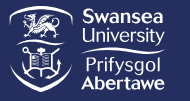The Swansea University Schools’ Partnership (SUSP) draws upon the University’s considerable academic expertise in supporting the development of effective primary teachers. SUSP provides high-quality ITE based on the principle of integrated learning.

Course Overview
Welcome to the Swansea University Schools' Partnership.
SUSP is committed to delivering high quality initial teacher education that meets the needs of a Welsh education system undergoing significant curriculum transformation.
The one year full-time Postgraduate Certificate in Education (PGCE) Primary with Qualified Teacher Status (QTS) offered by the Swansea University Schools' Partnership (SUSP) connects research and policy to primary practice.
Our PGCE Primary programme will allow you to develop teaching skills across the primary age phase and develop your understanding of the new curriculum in Wales. You will work with experienced, enthusiastic University tutors and mentors in our Partnership schools across South Wales to develop and reflect upon your own teaching practice.
The programme is unique in that after experiencing teaching placements across the primary age phase, you can chose to specialise in Foundation Phase, Key Stage 2, ALN (special school) or All-Age (3-18) contexts. This will not only enhance your knowledge of teaching and the curriculum in your specialist phase, but also deepen your understanding of how children learn and develop.
All aspects of the SUSP programme are underpinned by research, allowing you to benefit from the University's national and international reputation.
With the Partnership’s strong commitment to wellbeing, you will experience high quality personal, professional and academic support throughout the year.
Why Primary With QTS At Swansea?
The Swansea University Schools’ Partnership (SUSP) draws upon the University’s considerable academic expertise in supporting the development of effective primary teachers. SUSP provides high-quality ITE based on the principle of integrated learning.
This means that all aspects of the course have been developed collaboratively by a partnership of experienced and enthusiastic university and school-based staff. The programme is delivered, quality assured and reviewed as a partnership to consolidate that collaboration throughout the year.
Swansea University Schools’ Partnership (SUSP) delivers a high-quality, research and practice integrated programme premised on its vision of developing research-informed reflective practitioners who can contribute significantly to the quality of Welsh education.
The PGCE (Primary) programme is delivered by the Swansea University Schools Partnership (SUSP) which comprises Swansea University and Lead and Network Partnership Schools located across south Wales. The university and schools share accountability for all aspects of programme governance, design, delivery and evaluation. In addition, the Academy Hywel Tyfi provides 35 hours of Welsh Language tuition for all student teachers on the programme.
The programme comprises 3 modules:
The Exploring Pedagogy, Curriculum and Assessment in the Primary School module (EDPM31) develops student teacher’s understanding of, and ability to employ effective strategies for teaching, learning and assessment across the primary age phase.
The Research-informed Reflective Practice module (EDPM32) introduces primary student teachers to quantitative, qualitative and mixed method approaches to education research.
The Professional Practice and Placement module (EDP301) is designed to enable primary student teachers to work in a school ‘clinical practice’ setting and to work towards the Professional Standards for Teaching and Leadership at Qualified Teacher Status (QTS) level. It is primarily school based and comprises two block-teaching placements and the Practice and Theory (PAT) days.
Bout Swansea University
Swansea University has been producing world class research since 1920. We have a long history of working with business and industry but today our research has a much wider impact, reaching across the health, wealth, culture, and well-being of a global society.
We have achieved an extraordinary level of success in recent years with our research activity exceeding that of many larger universities. This, though, has not compromised the friendly and relaxed atmosphere that has always characterised the “Swansea experience”.
As we continue our journey as a 21st century University, we look forward to becoming a truly global institution, focusing on the big issues, and improving lives, while continuing to provide inspirational teaching.
History And Heritage
The University's foundation stone was laid by King George V on 19 July 1920 and 89 students (including eight female students) enrolled that same year. By September 1939, there were 65 staff and 485 students.
In 1947 there were just two permanent buildings on campus: Singleton Abbey and the library. The Principal, J S Fulton, recognised the need to expand the estate and had a vision of a self-contained community, with residential, social and academic facilities on a single site. His vision was to become the first university campus in the UK.
By 1960 a large-scale development programme was underway that would see the construction of new halls of residence, the Maths and Science Tower, and College House (later renamed Fulton House). The 1960s also saw the development of the "finite element method" by Professor Olek Zienkiewicz.
His technique revolutionised the design and engineering of manufactured products, and Swansea was starting to stake its claim as an institution that demanded to be taken seriously.
Work began on the student village at Hendrefoelan in 1971, the South Wales Miners' Library was established in 1973 and the Taliesin Arts Centre opened on campus in 1984. The Regional Schools of Nursing transferred to Swansea in 1992, and the College of Medicine opened in 2001.
Technium Digital was completed in 2005 and, barely two years later, the University opened its Institute of Life Science, which commercialises the results of research undertaken in the Swansea University Medical School. Work commenced on a second Institute of Life Science in 2009.
In 2012 we began an ambitious campus expansion and development project, including the opening of our Bay Campus in 2015; which is home to the College of Engineering and the School of Management.
In 2018 we opened the doors to two further projects, The College; Swansea University's joint venture with Navitas (The International College Wales Swansea, ICWS) and the Computational Foundry; the home of the College of Science's departments of Computer Science and Mathematics.
© 2025 coursetakers.com All Rights Reserved. Terms and Conditions of use | Privacy Policy